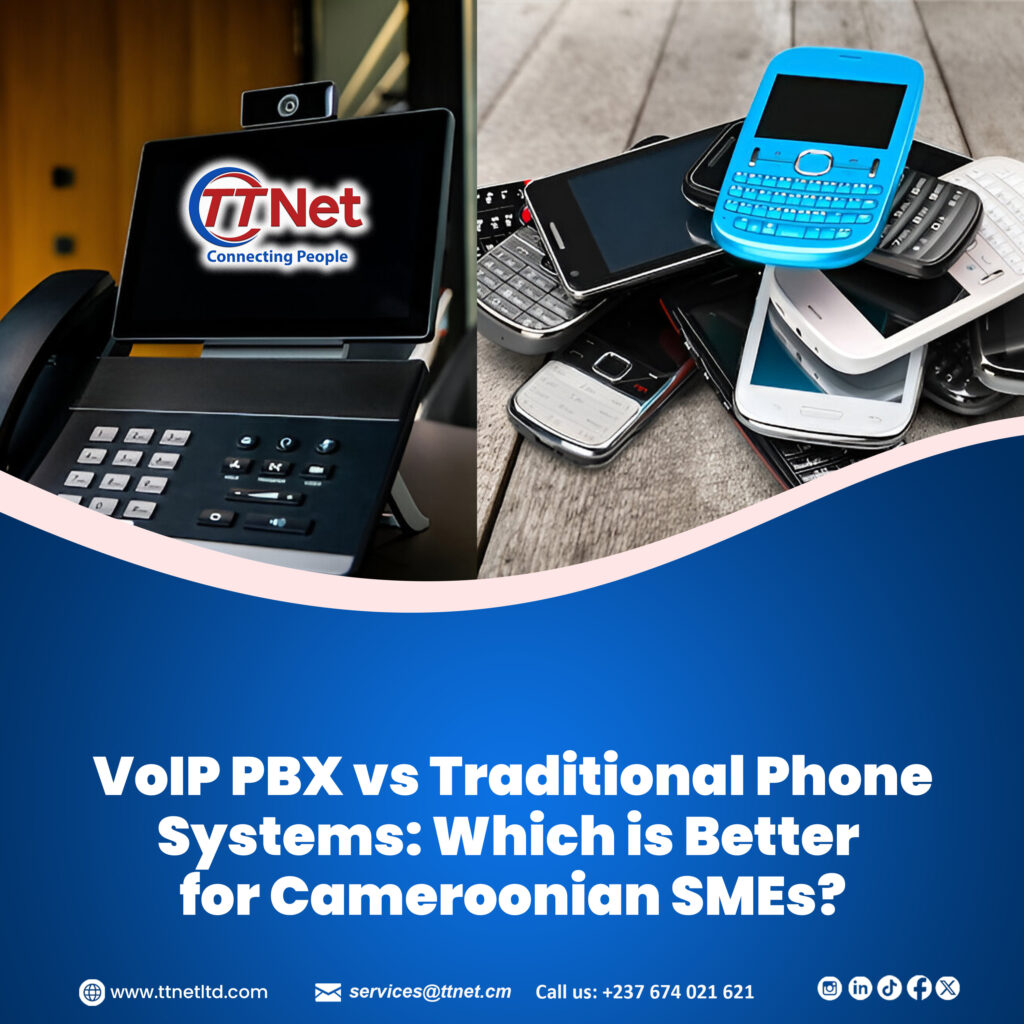
In Cameroon’s rapidly evolving business landscape, Small and Medium Enterprises (SMEs) face critical decisions about how to allocate resources effectively. Communication systems, often the backbone of customer interactions and internal operations, are no exception. The debate between traditional phone systems and modern VoIP PBX solutions is particularly relevant for Cameroonian SMEs looking to balance cost, efficiency, and scalability. In this post, we’ll explore the pros and cons of each system and explain why TTNet’s VoIP PBX service is emerging as the preferred choice for businesses across Cameroon.
Understanding Traditional Phone Systems
Traditional phone systems, also known as Public Switched Telephone Networks (PSTN) or Private Branch Exchange (PBX), rely on copper wires and physical infrastructure to transmit voice calls. These systems have been the standard for decades, offering familiarity and reliability in regions with stable telecom infrastructure.
Pros of Traditional Phone Systems
1. Reliability: Operate independently of internet connectivity, ensuring uninterrupted service during power outages or internet downtime.
2. Simplicity: Easy to set up and use, with minimal technical expertise required.
3. Call Quality: Dedicated lines often deliver consistent voice quality without latency.
Cons of Traditional Phone Systems
1. High Costs: Installation, hardware, and maintenance fees are substantial. International calls are notoriously expensive.
2. Limited Features: Basic functionality (call waiting, voicemail) lacks advanced tools like video conferencing or CRM integration.
3. Scalability Challenges: Adding new lines requires physical hardware upgrades, which are slow and costly.
4. Geographic Restrictions: Expanding to new locations often demands separate systems, complicating management.
For Cameroonian SMEs, these drawbacks are significant. High upfront costs strain limited budgets, while inflexibility hinders growth in a competitive market.
What is VoIP PBX?
Voice over Internet Protocol (VoIP) PBX uses internet connections to transmit voice and multimedia communications. Instead of physical lines, calls are routed through cloud-based or on-premise servers. This technology has gained traction globally for its cost-efficiency and versatility.
Pros of VoIP PBX
1. Cost Savings: Lower upfront costs (no hardware investment) and affordable international rates.
2. Advanced Features: Auto-attendants, call analytics, video conferencing, mobile app integration, and CRM compatibility.
3. Scalability: Add or remove lines instantly via online portals, ideal for growing businesses.
4. Mobility: Employees can make/receive calls from anywhere using smartphones or laptops, critical for remote teams.
5. Unified Communications: Integrate voice, video, messaging, and file sharing into one platform.
Cons of VoIP PBX
1. Internet Dependency: Requires stable, high-speed internet. Poor connectivity can disrupt service.
2. Security Risks: Vulnerable to cyber threats like hacking or phishing without proper safeguards.
3. Power Reliance: During outages, cloud-based systems may go offline unless backup solutions are in place.
Key Considerations for Cameroonian SMEs
Cameroon’s unique business environment demands careful evaluation of communication systems. Here are factors SMEs should prioritize:
1. Internet Reliability: While urban centers like Douala and Yaoundé have improved broadband access, rural areas still face connectivity challenges. VoIP adoption depends on local internet infrastructure.
2. Budget Constraints: SMEs often operate with tight margins. Upfront costs and long-term ROI are critical.
3. Growth Ambitions: Scalability is vital for businesses aiming to expand regionally or globally.
4. Technical Expertise: Managing advanced systems may require training or IT support.
5. Regulatory Compliance: Ensure systems comply with Cameroon’s telecom regulations and data protection laws.
Why VoIP PBX is the Better Choice for Cameroonian SMEs
While traditional systems offer familiarity, VoIP PBX aligns more closely with the needs of modern Cameroonian businesses. Here’s why:
1. Cost Efficiency
VoIP eliminates expensive hardware and reduces call costs, especially for international clients or diaspora communities. TTNet’s VoIP PBX, for instance, offers competitive per-minute rates and customizable plans to suit tight budgets.
2. Scalability for Growth
Cameroonian SMEs often start small but aspire to grow. VoIP allows seamless scaling, adding a new branch or remote worker takes minutes, not weeks.
3. Support for Mobile Workforces
With mobile penetration at 84% in Cameroon (World Bank, 2021), employees increasingly rely on smartphones. VoIP integrates mobile devices, enabling sales teams, field workers, and managers to stay connected.
4. Enhanced Features
Features like auto-attendants project professionalism, while call forwarding ensures no customer inquiry goes unanswered. TTNet’s platform includes analytics to track call performance and customer engagement.
5. Future-Proofing
As Cameroon invests in digital infrastructure, internet accessibility will only improve. Adopting VoIP now positions SMEs to leverage emerging technologies like AI-driven chatbots or 5G.
TTNet VoIP PBX: Tailored for Cameroonian Businesses
TTNet’s VoIP PBX service addresses the specific challenges faced by Cameroonian SMEs, combining affordability with cutting-edge technology. Here’s how TTNet stands out:
1. Robust Infrastructure
TTNet partners with local ISPs to ensure reliable connectivity, even in areas with intermittent internet. Their servers are locally hosted, reducing latency and improving call quality.
2. Affordable Pricing
Flexible subscription models (pay-as-you-go or bundled plans) cater to businesses of all sizes. No hidden fees mean predictable monthly expenses.
3. Local Customer Support
TTNet’s Cameroonian-based support team provides assistance in French and English, ensuring quick resolution of technical issues.
4. Security Measures
End-to-end encryption and regular security updates protect against cyber threats, a critical consideration for businesses handling sensitive data.
5. Feature-Rich Platform
From voicemail-to-email transcription to multi-level IVR systems, TTNet empowers SMEs to compete with larger enterprises in customer service.
Overcoming VoIP Challenges in Cameroon
TTNet mitigates common VoIP concerns:
– Internet Stability: Partnerships with ISPs ensure prioritized bandwidth for VoIP traffic.
– Power Outages: Integration with UPS systems and mobile data failover keeps lines active.
– Training: TTNet offers onboarding sessions to help teams maximize the platform’s potential.
Conclusion: Embrace the Future with TTNet VoIP PBX
For Cameroonian SMEs, the choice between traditional phone systems and VoIP PBX hinges on balancing immediate needs with long-term goals. While legacy systems provide short-term reliability, VoIP delivers unparalleled flexibility, cost savings, and innovation, key drivers for growth in a digital economy.
TTNet’s VoIP PBX service bridges the gap between cutting-edge technology and local realities, offering a solution designed for Cameroon’s unique challenges. By adopting VoIP, SMEs can enhance customer experiences, empower remote teams, and future-proof their operations.
In a nation where entrepreneurship is thriving, the right communication system could be the catalyst for unlocking new opportunities. For Cameroonian SMEs ready to take the leap, TTNet provides the tools to communicate smarter, grow faster, and compete confidently.
Upgrade your business communications today. Explore TTNet’s VoIP PBX solutions and discover the difference.

